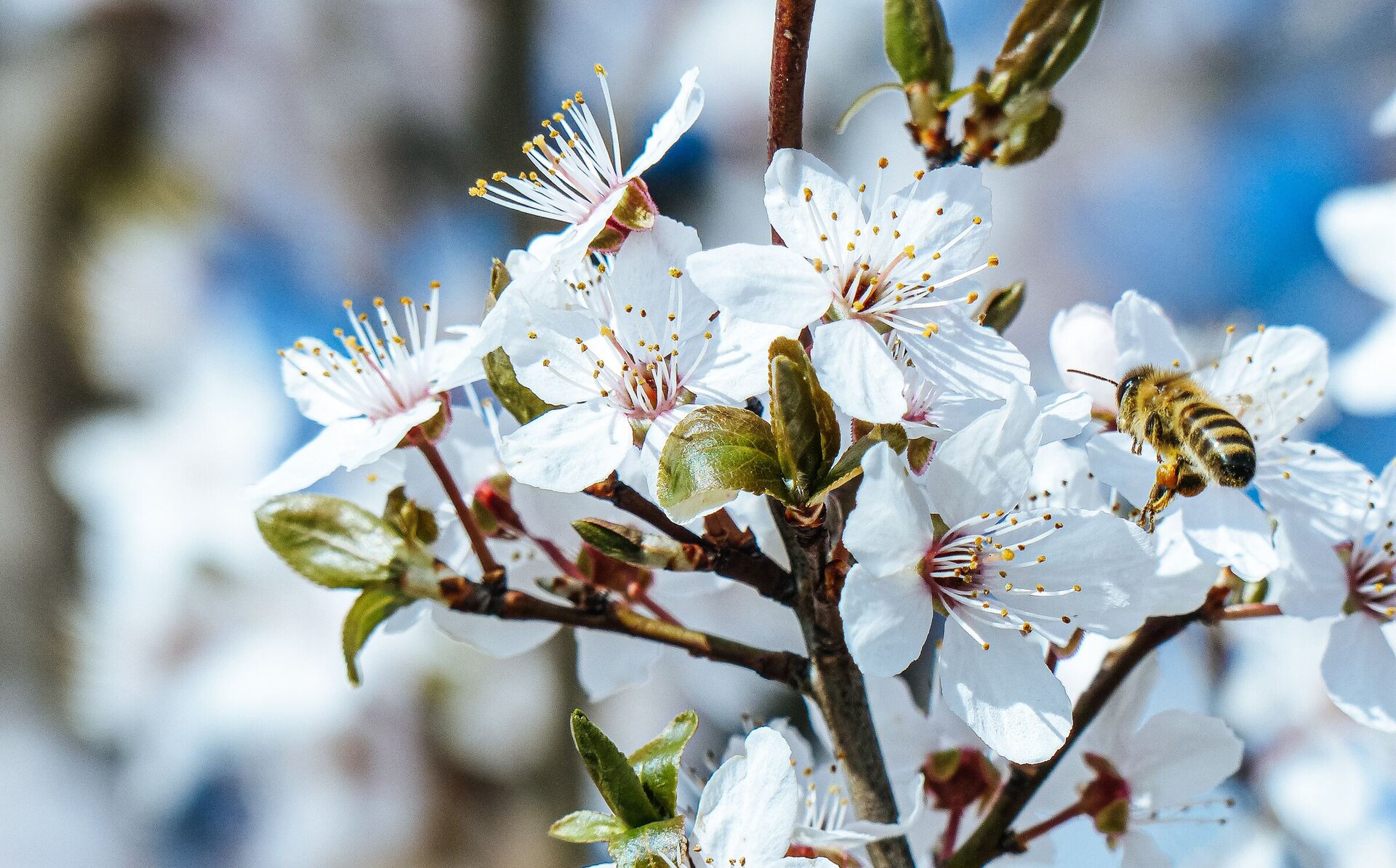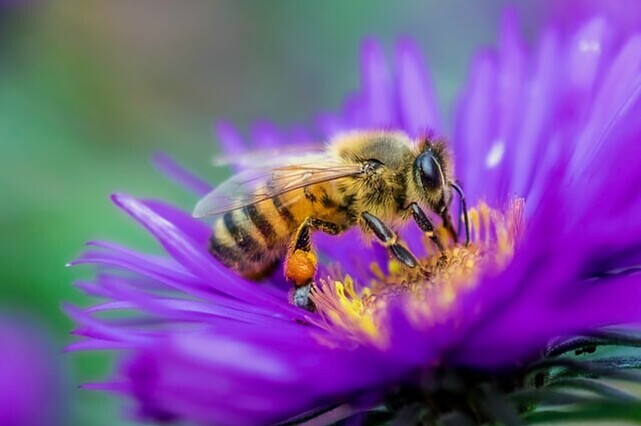General Analysis
Chemical analysis from research laboratories all over the world show that bee pollen is a complete food.
Bee pollen contains the following nutrients (the location and source of bee pollen can cause variability in the vitamin and mineral content of bee pollen):
- All essential amino acids
- All minerals, including phosphorus, potassium, magnesium, calcium, copper, manganese, iron and zinc
- Some trace minerals
- B vitamins
- Vitamin C
- Vitamin E
- Folic Acid
- Panthothenic Acid
- Rutin
- Lecithin
- RNA
- DNA
- Enzymes
- Anti-oxidants, including flavanoids, beta-carotene
- Lycopene.
Scientific evidence from all over the world and thousands of years of anecdotal evidence show a huge range of potential health benefits from the consumption of bee products (includes bee venom therapy, honey, pollen, royal jelly and propolis). They are as follows:
- promote anti-aging/longevity
- stimulate the immune system and fight against viral and bacterial infection
- regulate and balance hormones
- increase vigor and physical strength
- help regulate weight
- reduce cravings for food or nicotine
- stimulate memory and mental function
- fight chronic fatigue
- protect against hay fever and certain allergies
- help with stress and anxiety
- increased energy and stamina (bee pollen is taken widely by athletes)
- fight colds and respiratory infections
- help promote smooth, healthy and toned skin
- improved sexual function, facilitates fertility and may help reverse impotence
- may help to regenerate bone growth
- build tissue and muscle
- may reduce blood lipids and cholesterol
- may reduce high blood pressure
- rejuvenate the aged, sick or weak
- may help with menopausal-related symptoms
- may help endocrine system disorders
- hepato-protective (liver)
- support the body during pregnancy and menopause
- correct hormonal imbalances
- reduce or protect against coronary artery disease
- prevent and treat bladder infections
- promote wound healing
- reduce inflammation
- treat liver ailments
- protect against cancer
- relieve arthritis
- relieve depression
- reduce symptoms of diabetes
- prevent asthma attacks
- provide anabolic support
- assist weak or tired eyes
- prevent arteriosclerosis
- treat malnutrition
- treat mononucleosis
- improve mental alertness
- prevent and treat ulcers
- relieve symptoms of eczema
- relieve symptoms of impetigo
- may increase hemoglobin count and treat or prevent anemia caused by nutritional factors.
The healing, rejuvenating and disease-fighting effects of Bee Pollen are fully documented. See the following information on research and studies that have been carried out on the benefits of bee pollen.
How Bee Pollen May Help Specific Conditions
Acne
Dr. Lars-Eric Essen, a Swedish dermatologist, says, “When taken internally or used externally, bee pollen exercises a suppressive effect on facial acne and is an important skin rejuvenator because it contains a high concentration of nucleic acids, RNA and DNA, and a natural antibiotic”.
Allergies
There are two types of flower pollen. One is very light and is easily airborne. This light pollen causes allergies. The second pollen is heavier. It is collected by bees and made into bee pollen.
Bee pollen has been effectively used down through the ages to rid allergy sufferers of their afflictions. The technique, called desensitization, was developed at St. Mary's Hospital Medical School in London soon after the turn of the century. The treatment consisted of administering small amounts of the allergen to stimulate the patient's own immune system to produce antibodies that will eliminate the allergic reaction. It works rather like a vaccination does against childhood diseases. Desensitization is based on the premise that the administration of the allergen will cause the body to produce antibodies that will cancel out the effects of the offending substance when the patient is again exposed to it.
Allergy specialists prescribe bee pollen starting three months before the allergy season. They cautiously suggest starting with a few grains of bee pollen half an hour before each meal and gradually building this amount up over the three month period to one teaspoon before each meal. Very small incremental doses are recommended until one builds up natural immunity. If one experiences a violent reaction even at the minute dosage, stop and consult a physician.
Leo Conway, M.D., of Denver Colorado, treated his patients with pollen. Dr. Conway reported: "All patients who had taken the antigen (pollen) for three years remained free from all allergy symptoms, no matter where they lived and regardless of diet. Control has been achieved in 100 percent of my earlier cases and the field is ever-expanding”. Since oral feeding of pollen for this use was first perfected in his laboratory, astounding results were obtained. No ill consequences have resulted. Ninety-four percent of all his patients were completely free from allergy symptoms. Of the other six percent, not one followed directions, but even this small percentage were nonetheless partially relieved.
Anaemia
Bee pollen is rich in iron and folic acid, all of which are needed to prevent anaemia. Raw honey with royal jelly is also effective.
Arthritis
Bee pollen has helped relieve symptoms of some persons who suffer from arthritis. Bee venom treatments, according to numerous studies, appear more effective.
Asthma
The same relief that allergy sufferers experience from taking bee pollen is also experienced by those who have asthma.
Cancer
Substances in bee pollen may prevent cancer. Worldwide attention has been drawn to the fact that cancer is seldom found in beekeepers, all of whom daily use hive products. A survey of 19,026 members of beekeeping societies in Germany found that about 1 in 3,000 reported having cancer, whereas in the U.S. general population, 1 in 4 persons has or will have cancer in their lifetime. Exposure to bee sting venom may have something to do with the resistance beekeepers have to cancer.
There exists anywhere from 5,000 to 9,000 micrograms of active carotenoids, which are converted into vitamin A in the body. The pollens richest in carotene may contain 20 times as much as is present in an equivalent weight of carrots, thereby making pollen a good source of Provitamin A.
One study conducted by Dr Robinson and published in the journal of The National Cancer Institute in 1948, involved pollen which was ‘the bee gathered type’ and cancer in mice. A strain of mice was bred specifically to develop cancer tumors. The tumors would appear in the mice when they were between 18 - 57 weeks and they would die shortly after. The pollen used in the study "was the bee gathered type". One group of mice was fed mice chow only, whilst the other group was fed mice chow with the addition of bee pollen at a ratio of 1 part bee pollen to 10,000 parts food.
- "In the mice not given bee pollen, mammary tumors appeared at an average of 31.3 weeks. Tumor incidence was 100% and they all died".
- "The average onset of tumors of the mice given bee pollen was 41.1 weeks... around 30% later in time".
- "Seven mice in the bee pollen group had still not developed a tumor at 62 weeks of age when the tests were terminated".
- Dr Robinson concluded that bee pollen contains an anti carcinogenic principle that could be added to food.
- A study by Dr. Peter Hemuss, an Austrian physician, found an increase of gamma globulins among women receiving bee pollen to alleviate the undesirable side effects of radiation therapy.
Cholestrol
The Nicotinic acid in bee pollen acts on the formation of blood, as well as lower bad cholesterol levels in the blood. A significant decrease of the bad LDL or high density lipoproteins as well as increase in the beneficial HDL or low density lipoproteins are also observed. The HDL and LDL levels in our body determine the cholesterol effects in our body.
With more LDL levels than HDL levels, there is bound to be more cholesterol build-up. But with higher HDL and lesser LDL levels, cholesterol levels are lessened to a proper balance.
Colds
Colds are viral infections that seem to follow symptoms of fatigue and catarrh. Studies of athletes and children using bee pollen report fewer colds.
Colitis
Since bee pollen is effective in relieving constipation and diarrhea, it is not surprising that Russian doctors have found it relieves chronic colitis in people of all ages. Relief is faster when used with propolis.
Constipation
The usual cause of constipation is lack of high fibre, fruit, vegetables and whole grains in the diet. Bee pollen along with high fibre foods will greatly improve intestinal movement.
Depression
Russian researchers report bee pollen has given good results in the treatment of depression.
Diabetes
Dr. Rudolf Frey of Austria gave preparations of royal jelly and pollen to diabetics which provided considerable relief from conditions that accompany diabetes, like difficulty walking, insomnia, poor circulation, forgetfulness and chronic constipation.
Diarrhea
This condition is often relieved by the use of bee pollen.
Digestive Problems
Research has shown that bee pollen contains a substance which inhibits the development of numerous harmful bacteria, including E. Coli. Clincial studies have shown that bee pollen has a regulatory effect on intestinal function, relieving even the most stubborn constipation.
Studies also show that bee pollen has high enzymes and co-enzymes. Enzymes are necessary in the body for digestive and immune functions. The enzymes present in bee pollen are especially important for a balanced chemical metabolism.
Dr. Remy Chauvin of France reported, “Pollen has the capacity for regulating intestinal functions as well as the ability to destroy harmful microbes in the digestive system. The plant sugars in pollen are readily absorbed into the bloodstream, and pollen does not disturb the digestion.”
Dog Health
Alicia McWatters, Ph.D - "Bee pollen’s popularity is increasing as more and more dog owners and breeders are recognizing its great potential. Bee pollen contains many healing components and has been used for centuries as a source of nourishment. Today it is used not only for achieving better human health, but also to improve the health of our canine friends."
Endocrine Deficiency
Bee pollen has been successfully used to treat prostate conditions, menstrual disorders, problems associated with menopause, and other endocrine-related conditions.
Fatigue
Possibly the best fatigue-fighter known, as many athletes will testify, is pollen. Fatigue and catarrh signal the start of every disease, and we find that pollen takes care of both of them very nicely.
Hay Fever
Some persons report great relief from hay fever symptoms once they start taking raw honey (a teaspoon before each meal), or bee pollen. Follow the same procedure as for allergies.
Heart Disease
An article in the German magazine Naturheilpraxis concludes that taking bee pollen regularly is followed by a reduction of cholesterol, triglycerides and S lipoproteins. Improved circulation has been found in people who cannot exercise after being given bee pollen.
Hemorrhoids
Dr. Lars-Erik Essen of Sweden prescribes a pollen preparation for his patients with hemorrhoids and claims to get results in cases where the usual chemical suppositories fail. Pollen-based suppositories are available in Swedish drugstores.
High Blood Pressure
Soviet Dr. Naum Joirisch reports that bee pollen lowers high blood pressure.
Immune System
Studies show that the white blood cell count is increased in those taking pollen. Gamma globulins are the “stuff” antibodies are made of, and antibodies are our only internal defense against viruses. White blood cells of various types consume harmful bacteria and other foreign matter that enters the blood or lymph stream. In short, pollen appears to boost our immune system protection.
Impotence
Dr. Izet Osmanagic of the University of Saravejo in Yugoslavia found bee pollen effective in countering impotence in men between 20 and 52 years of age with a history of impotence. After one month of using pollen, the majority showed improvement in their sex lives.
Another study showed that a high percentage of post-menopausal women and women with hysterectomies reported renewed enjoyment of sex with their husbands after taking bee pollen.
Dr. Carlson Wade in his book "About Pollen" states, "Bee pollen contains a gonadotrophic hormone similar to the pituitary hormone, which functions as a sex gland stimulant. By providing energy and stamina it's also helpful for infertility and impotence, especially when combined with honey and royal jelly”.
Research conducted at various European Universities has shown in trials conducted with impotent men that:
- More than half of those given bee pollen experienced a dramatic improvement in sperm count.
- Most gained a higher level of self-confidence, and were able to perform better sexually... after just one month of taking bee pollen.
Viagra - move over!!!
Infections
Honey applied to external infections and pollen taken for internal infections is often sufficient assistance for the body to complete the healing. Pollen is sometimes described in studies as having a natural antibiotic effect.
Influenza
Bee pollen raises the immune system’s capability of producing antibodies for the destruction of the various influenza viruses that come and go.
Longevity
Bee pollen is perhaps best known for its use by some of the longest-lived people in the world. Dr. G. Liebold of Germany wrote, “Bee pollen causes an increase in physical and mental abilities ... activates sluggish metabolic functions, and strengthens the cardiovascular and respiratory systems.” It also provides all the foundational nutrients known to be needed by man and stimulates the immune system, the endocrine system and the circulatory system.
Dr. Nicolai Tsitsin attributed the longevity of most of the oldest Russians (in the Caucasus region) to their use of bee pollen and honey all their lives.
Bee pollen is also a powerful antioxidant (one of the highest) and has a high polyphenol content -- a super bioflavinoid.
In 1992, Dr. R. Chandra of John Hopkins University gave moderate amounts of bee pollen to a group of elderly patients and noted an increase in their immunity and a decrease in the risk of infections. He also demonstrated a direct link between the level of Iron, Zinc, B6 and Beta Carotene with a strong immune system (all components of bee pollen).
The British Royal Society of Naturalists has been researching the health effects of bee pollen for years. They state "The nutritional tests supervised by the station at Bures on hundreds of mice have demonstrated that pollen is a complete food, that it is possible to let several generations be born and live without the least sign of distress, while nourishing them exclusively on bee pollen."
Typical of the comments which come from knowledgeable researchers and physicians is that of Dr G Liebold, a physician and psychologist of Karlsrude, Germany who maintains that:
- "Bee Pollen is an excellent prophylaxis and therapeutic treatment against the precocious symptoms of old age. It should be considered a universal geriatric treatment in the form of a natural remedy".
He is not alone in this view as many other researchers and physicians have noted that taking bee pollen regularly results in:
- "an increase in mental and physical abilities, improvement in metabolic systems and the removal of other cardiovascular symptoms such as arteriosclerosis, cerebral insufficiency, and other sequelae."
Menopause
Undesirable symptoms of both natural menopause and unnaturally induced (surgery or radiation) menopause were greatly relieved and the quality of life generally improved for women given a bee pollen/royal jelly compound at the Clinic for Women, University of Sarajevo in Yugoslavia.
Menstrual Problems
Menstrual discomfort and irregularity of 60 young women between the ages of 15 and 20 were greatly relieved in all but 5 of those who took a pollen and royal jelly compound as part of an experiment performed at a Yugoslavian gynecology clinic. Drs. L. Pokrajcic and I. Osmanagic conducted the experiment.
Prostate Trouble
Prostatitis and enlarged prostate have both been treated with pollen. Dr. Naum Joirisch’s research lists prostatitis among the conditions that Russian doctors treated successfully with bee pollen, while Swedish and German doctors used a pure pollen product (Cerniltron from Sweden) together with conventional therapy to treat prostate problems non-surgically. Some researchers credit the zinc content of pollen as the primary agent of effectiveness.
Dallas Clouatre, Ph.D. is a researcher and author. In his book "Flower Pollen for Prostate Health", he reports that bee pollen consumption among men with prostate problems results in significant improvement and alleviation of symptoms. Specifically "less nighttime urination, improved bladder emptying, and reduced prostate discomfort."
A Swedish study conducted by Dr. Gosta Leander also concluded that bee pollen can significantly affect inflammation and swelling of the prostate gland.
Radiation Effects
Dr. Peter Hernuss of Austria studied the effects of radiation on 25 women at the Vienna Women’s Clinic, 15 of whom were given bee pollen while 10 were not. Those who used the pollen showed a higher level of immune system activity (higher gamma globulin and higher white blood cell count), less nausea, better sleep at night and less hair loss than those who did not take bee pollen. Yugoslavian studies support the findings of Dr. Hernuss.
Rheumatism
Rheumatism is a generic name that includes all the various conditions of the joints and muscles often characterized by inflammation, stiffness and pain, for example, neuritis, bursitis and rheumatoid arthritis. To the extent that dietary supplements can help balance the chemistry of the over-acidic rheumatoid body, some alleviation of symptoms may occur. However, bee venom treatments may work better for some persons and some conditions. It is best to ask your doctor about the bee venom approach.
Sexual Problems
See the information after “Impotence, Menopause and Menstrual Problems.”
Stress
Russian doctors claim effective stress system reduction with bee pollen. Dr. N. M. Artemov found that bee venom chemicals affect the pituitary and adrenal glands, stimulating natural cortisone release. Since cortisone counteracts inflammation in the body, one of the side effects of stress, bee pollen may exert some similar activity.
Bee Pollen is high in the B-Complex vitamins that are known to help reduce stress levels.
Strokes
Strokes are called “cerebral accidents” and may involve the bursting of a blood vessel in the brain, which can cause death. Rutin, which is plentiful in bee pollen, is known to strengthen the walls of blood vessels, especially the small capillaries. If the body receives sufficient rutin throughout life, the danger of strokes would be minimized.







